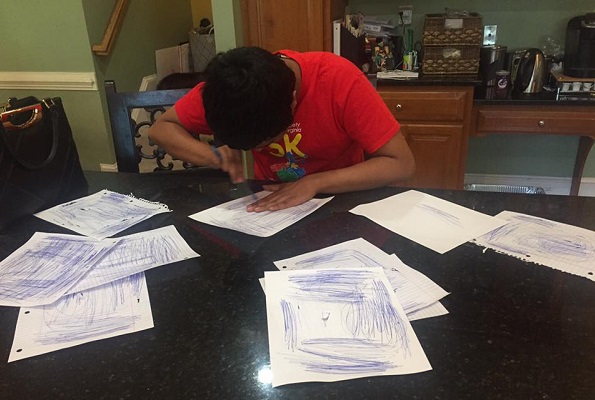
If you voice out loud the silent and secret yearnings of your heart, if you allow yourself to linger over the “what-ifs,” the “should-have-beens” and the alternate futures that never were yours or your child’s to begin with, then you’re in danger of upsetting some one or another. You’re possibly doing a disservice to the loved one about whom you are thinking.
This much I’ve learned – to keep it quiet, to internalize it as much as possible, to put a hard stop on any such meanderings into dangerous territory.
If I tell my husband or others about how I am finding it difficult to hear about my nieces or children of friends taking the SAT or PSAT, how they have gotten their driver’s permit and are practicing for the day when they will get their license, how though I am excited to hear about their college applications and deadlines and edit essays for them, it adds to the lump in my chest pressing down upon my breath …
If I say this out loud I inevitably get one of four responses:
- Really? That still bothers you? Our life and D being autistic has been our lived reality for so long that I don’t think that way. I really don’t compare him to others. – This one comes from my husband, and I am happy that he is in this more even-keeled place.
- You monster – how dare you linger upon what should have been rather then appreciating your child for being exactly who he is – a wonderful, perfectly imperfect, fantastic young autistic man who is carving out his own path. How dare you wallow in your own sadness at times when you should appreciate and love him for who he is. You are doing him grave disservice. – This comes from commenters on this blog from time to time.
- What about what your son wants? You’re so focused on what his future isn’t that you’re missing who he is and what he is doing right in front of you. He’s probably happy and proud of himself just as he is. Who are you to imagine things that other 17- or 18-year-olds are doing and impose those visions upon your son? – This comes from many in the neurodiversity community.
- Yep, I get it – This from those who own up to similar thoughts and griefs.
There is no daily mourning, no hourly weeping over what his life is, what our life is. Of course, there isn’t. There is joy and love and laughter in this living we have carved out. There is resilience, strength and a dedication to each other, between parents and children and between siblings, that fills me with gratitude and pride.
But this is the year I’ve been dreading. It’s the year we will file for guardianship of our son, to be able to make educational, financial and medical decisions for him once he turns 18 and officially becomes an adult. Will we still strive to understand his thoughts and decisions, try and figure out what his choices are? Of course.
But will we be in the driver’s seat for pretty much his entire life, trying to make the best decisions to help him gain the most independence, stability, safety and happiness as possible? Yes. Will that include him living with us? For the foreseeable future, yes.
Beyond that, probably not – because I do not want to face a situation where his father and I age and age and age, or grow incapacitated by illness and suddenly must situate D in a different home with little time to ease him – and us – into it.
I’d rather he eases into that part of his life while we are an active and involved part as well, where we and his siblings can continue to be constantly in touch and do our best to assure his well-being and that his needs are being met in the way he wants them to be.
Five years ago, I wasn’t ready to say that out loud – that he wouldn’t forever live with us. Because my God, are you kidding me? There is NO WAY I’d trust anyone else to support and help D the way I do. I still don’t have that trust. I’ll probably never will. But I have grown to accept that dichotomy of thought and feeling, to live with many frames of mind inhabiting one body.
Last week I put the wheels in motion for many of these things. While I’ve been working with the school system to have them conduct psychological, social, cognitive and other evaluations, I also picked up the phone and made appointments: With a local agency, to have a private psychological evaluation done in case his school-based psychological evaluation didn’t use the correct wording and terminology we needed to prove guardianship.
With his doctor, to have her write a letter of evaluation on what his daily living abilities are, his cognitive skills and other things she has observed about him in being his doctor and our first line of defense these past several years.
I called our lawyer, who several years ago helped us to draw our will, designate guardians for our children – which was no small task, given the enormity and complicated-ness of caring for and supporting D – and set up a special needs trust fund where we and anyone else in the family could leave money for D without violating any of the laws that we need to tip-toe around to make sure he continues to receive his Medicaid benefits.
It’s time, I told our lawyer. We need to start talking about guardianship, and you need to tell me, although I’m pretty sure I already know, what paperwork I need to gather. So, I made an appointment.
In anticipation of the long, drawn-out application to apply for D to receive social security benefits, I started pulling out boxes from the store room where I have kept years’ worth of IEPs, medical notes, lab results, school reports, functional behavior analysist reports, behavior intervention plans, research papers and evaluations of every shape and form – social, behavioral, speech, occupational, daily living, waiver supports, cognitive, physiological and psychological, just to name a few.
A veritable kaleidoscope of D’s past 16 years from the time he was first placed into early intervention upon the advice of his pediatrician and my insistence to where we are now – guiding and parenting a strapping, handsome, complicated and amazing 17-year-old. I look at these papers, spilling out of boxes in the haphazard filing system I devised and never digitized or organized since, despite my best intentions to do so, and they paint a picture of my son.
But they also don’t.
Because what I want to say is that no one will ever know the way I know and the way God knows and the way D knows himself. How he’s been hustled and dictated to and therapy-fied and poked and prodded and medicated and fed and bathed and made to try things that were so uncomfortable and difficult for him his entire life, all under the guise of trying to help him eke out a better life for himself.
Much of it were good decisions and beneficial to him and his intellectual, emotional and social growth. At least that’s what I think. D may think differently. Some of it I regret. I regret it so much that it has torn a permanent rip inside of me that will never heal, and yet I keep going on each day – working, parenting, writing, cooking, cleaning, yelling, crying, vegetating, sleeping, loving. And, I get angry at myself for doing so. I keep circling back to this passage I wrote on grief three years ago, which still holds true for me:
Grief and regret are meant to be swallowed and digested, masked behind the daily chores of life. And yet that’s what hurts me. I want to remain prostrated, hidden. I want to give into it and not move beyond it. But that is not the way this all works.
It is a most peculiar thing, this regret, this grief, living in a corner of your heart with an aching comfort. When you move forward and momentarily forget it, you feel a betrayal of that haircloth shirt you believe you should always be wearing. You feel that betrayal towards your loved ones who move on with their jobs, schools, eating, sleeping, playing, living. And yet, what else can there be? Life must be lived, and lived in a manner that is as full of happiness and hope as possible, though that too feels like a betrayal at times.
But one can’t live in a perpetual state of grief, regret and betrayal, because that will break you in a way from which coming back together may be impossible. Truly, this is not my every day, this is not D’s every day, I dare say. There is too much good, too much beauty, too much love around us to give in to the monumental unfairness of everything that has been unfair.
There is D being D, and that is just fine.
And so, D is not taking his SATs. He is not getting his driver’s license this year. I don’t rule out the possibility, but I am practical enough to not bet on it. I do firmly believe there is no timeline on his progress, no linear portrait of milestones for him. He paints his own picture, he writes his own stories.
And, the only forgiveness I seek is from him, for sometimes feeling a low-level of sad at what a different present and future may have looked like for him in an alternative universe, in his senior year of high school, instead of fully and totally finding my peace with what is.












